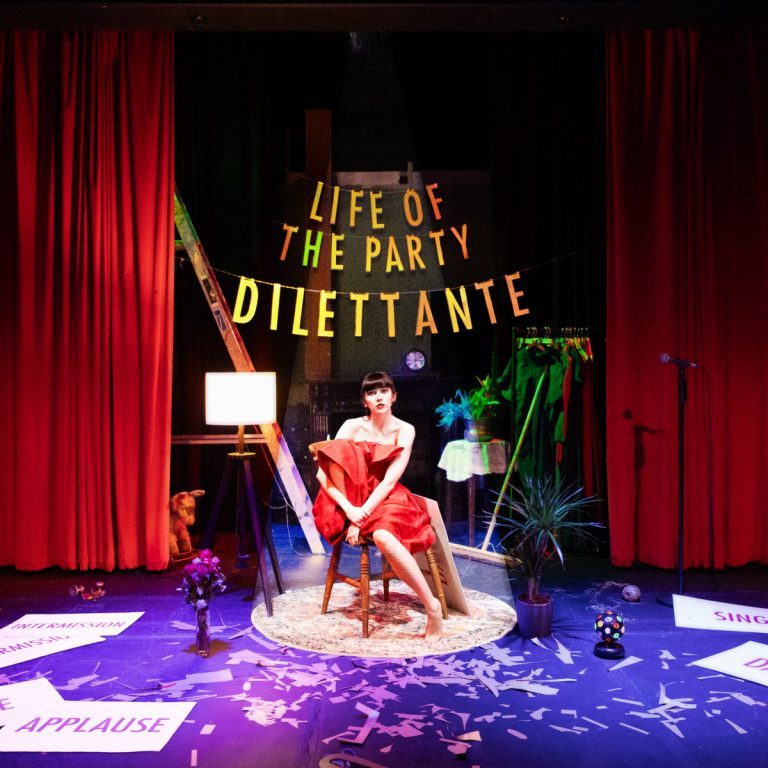Not everyone likes being the centre of attention, which is fair enough since we all have different appetites to the idea of public speaking or performing for an audience. For a musician to step away from the spotlight isn’t unheard of; there are plenty of artists who keep themselves to themselves and to their recording studios, preferring the making of the music as opposed to performing it for a crowd. Francesca Pidgeon (the leader of the art-rock collective Dilettante) is one such person. “I like being alone! It’s really weird to me that I’m a performer. The performance stuff doesn’t really come very naturally to me,” she explained in a recent interview. Her new album Life of the Party covers topics like masking in public settings, neurodivergency, and sexual assault and the associated aftermath; it’s of little surprise that Pidgeon would much rather be on her own in her converted freight container studio.
And if Life of the Party captures one consistent throughline, then it’s that feeling of isolated creation, of tinkering away endlessly to one’s own end. Fittingly it’s the music of someone who wants to get away from the chatter of the soirée, to leave polite company and instead lock themselves in their room. It’s a dense album of maximalist pop music, a cabaret of instruments (of which Pidgeon plays the majority of herself) and sardonic lyrics that spill out across 12 tracks. As candid as it can be during its most revealing moments, it can be an exhausting 46 minutes.
There are small masterpieces of Pidgeon’s own genre here, songs that serve as self portraits as well as vignettes that condense all her best elements into a catchy few minutes. “Easy Does It” is a slice of slow dance pop about tempering lust, complete with sliding bass and synths driving the track like machinery. Speaking of Pidgeon’s sudden disenchantment with roller derby, opening track “Fun” comes with party horns, unorthodox percussion (including radiators and coffee mugs), and layered voices delivering a wry central sentiment (“I’m just having a breakdown”). Peppy staccato piano chords announce “Cake” before the song is decorated with flutes and sugary riffs while “Honey” boasts chirpy guitar chords and a juxtaposing sardonic delivery of the chorus (“Honey, do you think you were funny?”).
As slices in themselves, these are enough to sate your appetite for Pidgeon’s own brand of music. There are hints of St. Vincent, Fiona Apple, Björk and Self Esteem across Life of the Party, but you can always hear Pidgeon reaching for something that is her own. It’s still forming though. On “Twice As Clean” she veers into more experimental territory with stormy electric guitar chords, rumbling drums, and a loose and baggy form. It’s deliberately not static, formless, and not easy to read, and while it doesn’t click into place, it speaks to Pidgeon following those more curious ideas. Similarly closing track “The Stuff Dreams Are Made Of” takes its inspiration from Twin Peaks, choosing to ride off into a sunset of eerie layered clarinets and warm synths instead of going for the big finish it hints at.
Sometimes being in her own head does make for music that’s a little too internalised and obtuse. The sound of a sliding electric bass becomes a little grating a few tracks in, and the woozy bob of “I’m In Love With Falling In Love” (complete with bewitching Greg Ashley and Tom Waits-like drunken brass as she deconstructs the fickleness of infatuation) shows just how multilayered and congested everything else is here; if there were more moments of contrastingly sparer arrangements, the album would no doubt have flowed that bit more dynamically. Funnily enough “Stone”, taking inspiration from a rereading of Milan Kundera’s The Unbearable Lightness of Being, speaks to decision paralysis (among other things); the end result on the track seems similar to a lot of the choices here: when you can’t decide on on thing, why not add everything to the mix?
Lyrically Pidgeon is sharp and observant, with quips that cut with a scathing stare. There are plenty of good examples: “Won’t you peel me off the ceiling / Life in general is unappealing”; “I don’t like to smoke / but oh, I like who stands outside”; “Everyone knows that a monkey wearing clothes isn’t half as entertaining if you stop to think about it.” However, words are often crammed together in an unusual set of shifting tempos. Run-on sentences make for lyrics that can be tricky to dissect, but do at least offer rewards for those who want to mine the album of all its details.
“Aren’t I just the life of the party / Aren’t I just whoever you want me to be?,” Pidgeon delivers with a deliberate sarcasm on the album’s title track. She knows what she’s doing at each turn on the album – from the poker-faced tone to the piles of vocal harmonies – and while that doesn’t always translate to a palpable hook to get caught on throughout its 12 tracks, Life of the Party is undeniably a personal work. It’s the work of someone left to their own devices, creating the music that feels right for them, and going off in directions they want to. It’s often enjoyable, full of details and candied arrangements, but does become a little tiring with repeated spins. But this is Pidgeon hunkering down in her own space; she never asked for the spotlight, so if you take Life of the Party on its own self-contained terms, it’s a document of exploration, worry, love, questioning societal pressures, and processing life as it happens. Let Pidgeon leave the party; she’s making the music she wants to.

